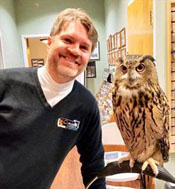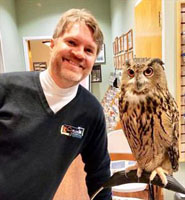Don Woodman

Dr. Don Woodman and his Eurasian eagle-owl, Hermes
 "The only thing that is constant is change." - Heraclitus
"The only thing that is constant is change." - Heraclitus
"Sincerity - if you can fake that, you've got it made." - George Burns
"If you're your authentic self, you have no competition." - Anonymous
I interviewed for my first job in 1995, around the time Banfield was rolling out its first veterinary practices.
I remember going on job interviews and no matter where I went, at some point the conversation with the practice owner would touch on the new phenomenon of Banfield Pet Hospital opening veterinary practices inside big-box pet stores. At the time, the extent of Banfield's threat to independent practitioners was the subject of wide speculation. The fear that the mega-corporation would stamp out independent practice was palpable.
More than two decades later, we see how Banfield's entry in veterinary medicine has played out: The corporate practice chain filled a niche in the marketplace and has flourished to encompass more than 1,000 clinics. Other corporate chains have followed, with Veterinary Centers of America, or VCA, among the largest proliferators. VCA bought standalone practices and rebranded them with their corporate logo. For example, Main Street Animal Hospital would become VCA Main Street. Personally, I was always dubious of the wisdom of this rebranding. I'm not sure that VCA was a powerful brand to the average pet owner.
Perhaps others agree, because the current trend in veterinary corporatization seems to be distinctly not rebranding practices in any way, making corporate ownership of a practice largely invisible to the average veterinary client. Today, a half-dozen or more corporate chains are growing, gobbling up private practices and operating them as though there isn't a change in ownership.
One obvious example is National Veterinary Associates, or NVA. The company has acquired more than 425 locations throughout the United States, Canada and Australia, each looking like they're independently operated. Pathway Veterinary Alliance, a management company that owns clinics under multiple brand names, operates similarly. According to the company’s website, Pathway has more than 150 clinics in 27 states. None of those veterinary practices bears the corporation’s name, not even on their individual clinic websites.
Some may be upset by this behavior. It might seem unethical or misleading, and I don’t disagree. But this is not where I would focus. Through this corporate subterfuge has emerged a unique opportunity for independent practice owners.
Corporate chains are not downplaying their ownership because they lack the funds to correctly market their acquisitions. It's not an accidental oversight, either. Rather, they are expressly choosing not to highlight changes in ownership because they view the corporatization of a practice as a marketing liability.
Corporations have several advantages over independent practices:
- They enjoy an economy of scale that allows them to have lower fixed costs, and they can and do leverage their size and buying power to negotiate better prices than independent practices. The lack of business acumen of the average veterinary practitioner is legendary. This, too, is an area in which corporations can outcompete the average independent practice.
- Corporate practices can develop and employ more sophisticated and rational pricing strategies, and they can use inventory control strategies that veterinarians largely are ignorant of to reduce their cost of goods sold.
- Corporations may have a hard time outcompeting independents in the largest expense category of veterinary practices — employee costs. Veterinary medicine already is notoriously low paid, so corporations don’t have much room to cut costs in this area. But they can manage scheduling and overtime more efficiently than the independent small business.
While corporations may excel at the transactional elements of running a veterinary practice, veterinary medicine is different from most businesses. Or, at least, we like to tell ourselves that it is different. When we are dealing with people’s pets, there is more than a transaction occurring. There is a relationship involved. As veterinary practices work to secure and reinforce the bond between people and their pets, the practice also is developing a bond with the owners. This is the relationship aspect of medicine. Whereas corporations may be able to outcompete independent practices at transactional medicine, independents hold the edge at relationship medicine. This is the threat that corporations recognize, which leads them to obfuscate the ownership of practices they acquire.
Currently, authenticity is a real concern for consumers. The trend is for shoppers to seek out locally owned businesses. Restaurants vie to source their ingredients locally, and local craft brewers are all the rage. While veterinarians can increase their purchasing power by joining a buying group and educate themselves to increase their business acumen, corporations will be hard-pressed to increase their perceived authenticity.
Members of the newly formed Independent Veterinary Practitioners Association have been discussing this trend. Full disclosure, I am an IVPA board member and co-founder of the organization. We are barely off the ground but already fielding calls from clients who have discovered that their veterinarian has sold to a major corporation, and they are looking for help in finding another independently owned practice.
According to IVPA Executive Director Terry Tosh, pet owners contacting IVPA lament about being billed for the unwanted tests or procedures required by corporate policies. They don't appreciate the corporate business environment. Even an associate veterinarian has complained to IVPA that she feels constrained, no longer free to treat patients as she had before her practice's buyout.
In coming months, the IVPA plans to launch a social media advertising campaign aimed at promoting the benefits of independently owned veterinary practices to consumers. As part of this campaign, IVPA members can receive a window cling identifying their practice as independently owned. Look for additional marketing tools from the IVPA in the near future.
While practitioners may feel frustrated to see corporations hide their ownership of the practices they acquire — and yes, it is a legitimate frustration — the reality is that it is just as valid and more productive to see this issue as an opportunity.
About the author: Don Woodman, DVM, earned his veterinary degree in 1995 from the Virginia-Maryland College of Veterinary Medicine and has owned the Animal Hospital of Northwood in Safety Harbor, Florida, since 2001. In 2017, he co-founded the Independent Veterinary Practitioners Association, an organization dedicated to the advancement of independent practice. Woodman is married with two sons and has a variety of pets, including an Eurasian eagle-owl named Hermes.